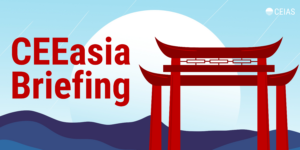Welcome to the 23rd issue of the #CEEasia Briefing.
In this issue, we dissect the following topics:
- Opposition Candidate’s Challenge to Orbán’s China Policy
- Chinese Presence in Serbia
- Beginning of a New EU Taiwan Policy?
- V4-Korea Business Forum
Do you need to know more about East Asia? Don’t hesitate to shoot us a message about custom analysis tailored to your needs.
1. Opposition Candidate’s Challenge to Orbán’s China Policy
What’s going on? Hungary has long been described as China’s closest partner in the EU. It was one of the first countries to join the Belt and Road Initiative (BRI) and has maintained rather intensive relations with Beijing over the past few years. This includes cooperation in digital industries and the Covid-19 vaccine procurement. The upcoming parliamentary election, however, might create a potential U-turn in the EU member state’s policy towards China.
Going deeper… The reason behind this is Péter Márki-Zay, the joint opposition candidate challenging the current Prime Minister Viktor Orbán. More specifically, Mr. Márki-Zay seems determined to restructure Budapest’s ties with both Beijing and Brussels, the latter of which has been subjected to increasing attacks and politicization under Orbán’s government. Márki-Zay declared that if he wins the next year’s election, he will “revisit and review everything”, including the infrastructure loans from Chinese policy banks, the controversial plan to build a Chinese university campus in Budapest, and the corruption of the current government surrounding such policies. He also pledged to stop using a Hungarian veto to block the EU’s criticism of China when it comes to human rights violations and its Hong Kong policy.
When it comes to China policy, the public appears to side with the opposition. Indeed, there is little support among Hungarians for Orban’s policies toward China. Only about one-fifth of the respondents declared that they were satisfied with the activity of the prime minister toward China, while more than one-third were dissatisfied (the rest being neutral). Even Orban’s supporters seem to be predominantly negative about China and dissatisfied with his China policies.

This means… Given PM Orbán’s determination to keep his power, Márki-Zay’s electoral victory is far from guaranteed. But the recent eruption of vocal opposition against the planned satellite campus for China’s Fudan University indicated shifting attitudes amongst the public, which are accompanied by increasing demands for transparency when it comes to similar projects. The future continuity of the current dynamics in the Sino-Hungarian relations is therefore unclear.
Further reading:
CEIAS: Hungarian Policy Toward China Might Be Facing a Seismic Shift
FT: Political outsider prepares to take on Hungarian premier Orban
SCMP: Hungarian opposition candidate vows full review of Orban’s close ties with China
2. Chinese Presence in Serbia: human rights & pollution
What’s going on? As part of his October tour of the Balkans, Chinese Minister of Foreign Affairs Wang Yi visited Serbia, meeting with Serbian President Aleksandar Vučić. A few weeks later, reports emerged of dire working and living conditions of Vietnamese workers employed by China Energy Engineering Corporation, which is building a tire factory for another Chinese company, Linglong Tire, in the Serbian city of Zrenjanin.
Details… According to the reports, the workers were housed in overcrowded barracks without electricity and drinking water and with their passports taken away. Whereas the human rights, labor law experts, and the European Parliament labeled such conditions “modern slavery”, the Serbian government was slow to react. Once they reacted, the official responses ranged from blaming the workers for their housing predicament, accusing the MEPs of “satanizing Serbia” to shifting the focus on the future economic benefits, namely the 1,200 jobs and USD 600 million in annual revenue the factory is supposed to create.
Going deeper… The human rights controversy is not the only one surrounding the factory, which the Serbian authorities repeatedly praised as China’s largest greenfield investment in the country. An earlier controversy centered around the plant’s environmental impact. This is a sensitive topic in a country where several Chinese investments led to the environmental degradation of local ecosystems. A Chinese-owned steel plant in Smederevo is another example of environmental negligence from the Chinese side, with recent reports suggesting higher cancer rates amongst the local population caused by the red dust emitted by the plant.
This means… The inadequate response by Serbian officials is, however, hardly surprising, considering their closeness to China. Indeed, Sen Nguyen from the SCMP reported that the chairman of Linglong attended Vučić’s inauguration back in 2017 and has close ties to the current government. Chinese companies frequently receive preferential treatment from the Serbian authorities, who help China circumvent the laws of their own country. And when it comes to Chinese investment in polluting industries, Nguyen points out that the government tends to declare such projects to be of “national interest” to presumably silence opposition.
Further reading:
Euractiv: MEPs denounce ‘slave’ labour conditions in Serbia
CHOICE: Major Chinese Investment in Serbia Mired By Worker Abuse Controversy
SCMP: Vietnamese workers at Chinese tyre factory in Serbia get back passports as activists call for human trafficking probe
3. Beginning of a New EU Taiwan Policy?
What’s going on? A seven-member delegation from the European Parliament’s Special Committee on Foreign Interference and Disinformation visited Taiwan in early November. During this unprecedented three-day visit, the purpose of which was to learn from Taiwan’s experience combating Chinese disinformation campaigns, the delegation met President Tsai Ing-wen and other high-ranking Taiwanese officials. The delegation was led by Raphaël Glucksmann, an MEP sanctioned by China, and also included two MEPs from Lithuania, which is in an ongoing dispute with China following the country’s decision to allow Taiwan to establish its de facto embassy in Vilnius.
Going deeper… The visit came only days after the Taiwanese Minister of Foreign Affairs Joseph Wu returned from his trip to Europe, during which he visited Slovakia and Czechia and met undisclosed EU officials in Brussels. The Parliament has long been the focal point of the EU’s support for Taiwan. It recently published its first-ever standalone report on EU-Taiwan political relations and cooperation, which was adopted with 580 votes in favor and 26 against. What is more striking, however, is the report’s endorsement by the Executive Vice President of the European Commission Margrethe Vestager, who did so on behalf of the EU’s top diplomat Josep Borrell. Another sign of a shift at an EU level came from Presidents of the European Commission and Council, who signed a letter reiterating the right of the EU and individual member states to develop relations with Taiwan.
This means… Despite threats from Beijing, Glucksmann rejected the Chinese labeling of the visit as a provocation. In fact, as suggested by Thorsten Benner from the Global Public Policy Institute in Berlin, the visit did not breach the EU’s One-China Policy. In fact, the harsher rhetoric against China and warming relations with Taiwan from the side of both individual member states and the EU are driven by China’s increasingly assertive behavior in its domestic and foreign affairs. Nevertheless, this should not be interpreted as signaling prospects for an independent Taiwan policy or progress on any major issues such as the investment deal between the EU and Taiwan. The EU as a whole will try to continue its balancing act between the US and China, and although there is more space for cooperation with Taiwan, in areas such as disinformation and semiconductors, a major realignment is not on the horizon, at least for now.
Further reading:
POLITICO: Beijing fires warning at EU after MEPs meet Taiwan president
The Diplomat: EU Disinformation Committee Heads to Taiwan
Foreign Policy: Europe is Doubling Down on Taiwan
4. V4-Korea Business Forum
What’s going on? Prime Ministers of the Visegrád Four (V4) countries met with South Korean President Moon Jae-in during the second V4-Korea Business Summit on 4th November in Budapest. In addition to the importance of the partnership, future investments and areas of cooperation were discussed. These are to include the production of batteries for electric vehicles, which follows on from the extensive presence of the Korean automotive industry in the V4, as well as cooperation in biotechnology and defense.
Going deeper… South Korea is a major economic partner for the V4 countries, not only in terms of trade (V4 as a whole is South Korea’s second-largest trading partner as well as the largest export market within the EU) but also in terms of investment. The cumulative value of the FDI flowing to the region from South Korea is USD 10 billion. The V4 countries have a common interest in attracting further investment, but they are also in competition with each other. The possibility of cooperation between the V4 and South Korea on the planned high-speed railway, which is to connect Warsaw, Brno, Bratislava, and Budapest, was emphasized by the V4 states. A feasibility study for this ambitious plan is currently being prepared, but Hungarian PM Orbán has nevertheless asked Moon Jae-in to “follow the biggest V4 joint economic venture.” He also expressed hope that the project would attract interest from the South Korean industry.
This means… Cooperation in the field of electromobility seems to be the most promising, as it could follow the existing investments and plants of South Korean carmakers in the region. Slovak PM Heger also emphasized hydrogen mobility as one of the areas of interest for the Slovak government and the current Minister of Economy. All five countries participating in the summit share a positive attitude towards nuclear energy, which is an area in which South Korea would like to assert itself. The Koreans also brought up the topic of defense cooperation, but the results are ambiguous here. The Slovak government, for example, has excluded South Korea from competition for infantry fighting vehicles due to unspecified “political” reasons.
Further reading:
CEIAS: V4-South Korea trade was worth $16.8bn last year. How far can relations progress?
Korean Herald: South Korea seeks cooperation with Visegrad Group in finance, defense and bio
Pravda: Lídri V4 sa stretli s juhokórejským prezidentom, lobovali aj za vysokorýchlostnú železnicu








